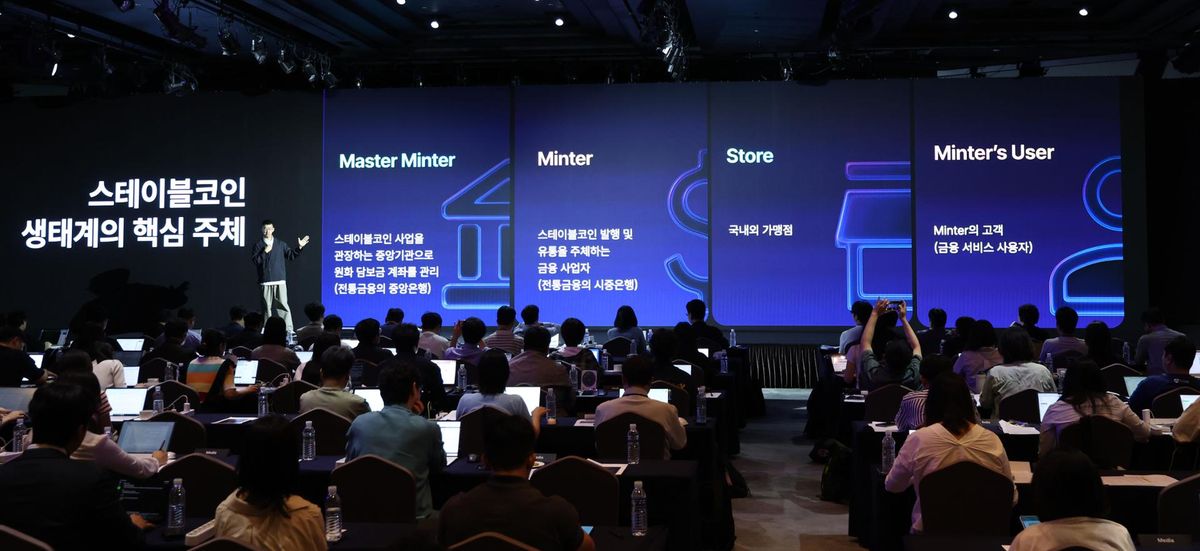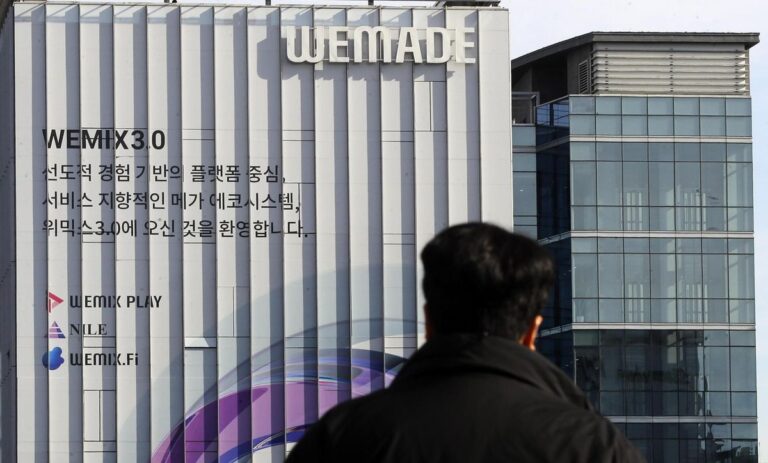Wemade, a Korean gaming company, launched its blockchain venture in 2018 with just four employees. Seven years on, that team has grown to more than 200.
Along the way, the company has endured market volatility, regulatory setbacks and repeated controversy. But at least one thing has become clear: It isn’t walking away.
“There’s no other company in Korea with this many people working on blockchain,” said Shane Kim, executive vice president of Wemade and CEO of its blockchain subsidiary Wemix, in an interview with The Korea Times. “We’ve incurred hundreds of millions of won in losses from our blockchain business. Even so, we never gave up. We’ve kept going all the way until now.”
Best known for game franchises such as Legend of Mir and Night Crows, Wemade has emerged as one of the most aggressive players integrating blockchain into Korea’s gaming landscape. Through Wemix, it has rolled out initiatives including cryptocurrency development, play-to-earn (P2E) games and a broader digital asset ecosystem.
The business venture started amid a wave of investor enthusiasm and a booming crypto market. But the journey has been far from smooth.
As legal and regulatory uncertainty intensified, many Korean blockchain projects shuttered or shifted overseas. Wemade adjusted its strategy, limiting its P2E offerings to international markets, where such games remain legal.
Further turbulence followed. In late 2022, the Wemix token was delisted after discrepancies were found between the reported and actual circulation figures. Although it was later relisted following corrective measures, another setback emerged this year.
In March, a hack resulted in losses of around 9 billion won ($6.28 million). The delayed disclosure of the incident drew public criticism and ultimately led to a second delisting. The company, however, asserted that the mainnet — the core blockchain protocol — remained secure, explaining that the breach occurred in the bridge used to transfer Wemix tokens to other blockchain networks.
Wemade headquarters in Seoul / Newsis
Still, Wemade appears undeterred in its commitment to blockchain. Kim is now concerned with the long-term sustainability of the business.
“Wemix may not be among the world’s top 10 right now. But if only 10 global blockchain projects were to survive in the end, Bitcoin would survive, Ethereum would survive, and I hope Wemix will be one of them,” Kim said. “With that belief, we’re doing our best to build a sustainable and scalable business.”
While gaming remains the group’s core business, Kim said new momentum is building around a Korean won-based stablecoin.
Stablecoins, which peg their value to fiat currencies such as the U.S. dollar, are designed to reduce volatility and improve cross-border payment efficiency. The Korean government is expected to finalize related legislation by year-end.
“As the U.S. rapidly institutionalizes dollar-based stablecoins, they now account for 99 percent of the global stablecoin market. With the dollar’s growing influence, governments around the world can no longer avoid grappling with regulatory frameworks for stablecoins,” Kim said.
On Sept. 18, Wemix hosted a demonstration event for its stablecoin initiative, dubbed Project Stable One, and announced the development of a dedicated mainnet.
Rather than becoming a stablecoin issuer itself, Wemix plans to form a consortium and act as a technology partner. A test network is scheduled to launch in November, with a full rollout expected in the first quarter of 2026. The firm also intends to make its code open-source, allowing Korean companies interested in launching stablecoin services to build on the infrastructure.
Despite many industry players moving into the stablecoin market, Kim said Wemix’s advantage lies in its ability to build a private mainnet that “understands and reflects Korean culture.”
Kim noted that most Korean blockchain firms have either closed or relocated abroad.
“As a first-generation blockchain project, we believe the technology and experience we’ve accumulated over the years are hard to match in Korea,” he said.

Participants listen during a demonstration event for Wemade’s stablecoin initiative, dubbed Project Stable One, at a hotel in Seoul, Sept. 18. Yonhap
“To issue and circulate a Korean-style stablecoin in full compliance with local regulations, there needs to be a Korea-based company capable of making strong technological contributions. Only then can the regulatory authorities proceed with confidence,” he added.
Even so, skepticism persists. The Wemix token has been delisted twice — an unprecedented move in Korea’s crypto history — raising questions about whether the company can guarantee the stability required to support a reliable stablecoin. Investor frustration and distrust remain high.
Kim acknowledges the challenges but believes the solution lies in long-term commitment and global collaboration. “To address these concerns, we believe it’s essential to work with top-tier global technology partners,” he said.
He also points to what he views as a structural imbalance. While foreign crypto projects are often spared heavy scrutiny, Korean firms face disproportionately high standards.
That, Kim says, has contributed to the collapse of much of Korea’s blockchain foundation, even as the country remains the world’s second-largest crypto investment market after the U.S.
Still, with stablecoins inching toward institutional legitimacy and regulatory stances gradually evolving, Kim sees room for optimism.
“It could become a turning point — bringing global competitiveness back to Korean crypto companies, attracting talent back to the industry, and ultimately helping to rebuild the ecosystem with meaningful contributions and outcomes,” he said. “We’ll keep doing our part quietly and steadily, trusting that the right time and opportunities will come again.”
Images are for reference only.Images and contents gathered automatic from google or 3rd party sources.All rights on the images and contents are with their legal original owners.

